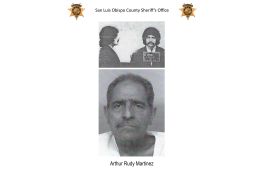Police have cracked a cold case with DNA found on the razor of the man they say raped and killed two women more than four decades ago in California.
DNA from a razor used by Arthur Rudy Martinez matches that left by the attacker at both crime scenes in the late 1970s, the San Luis Obispo County Sheriff’s Office said.
Martinez died of cancer in June 2014 at a prison in Spokane Washington, where he was serving life for robberies and two other unrelated rapes.
The two victims did not know each other
The cases of Jane Morton Antunez and Patricia Dwyer date to 1977 and 1978, respectively.
In November 1977, Antunez was found dead in the backseat of her car in Atascadero, California.

The 30-year-old woman had been sexually assaulted and her throat slit. She was on her way to her best friend’s house, but never made it, the Sheriff’s Office said.
Months later, in January 1978, Patricia Dwyer was found stabbed to death and sexually assaulted in her home.
Like Antunez, the 28-year-old also lived in Atascadero. While the two victims had mutual friends, they did not know each other, authorities said.
“Both victims’ arms were bound behind their backs by different bindings that were found at each scene,” the Sheriff’s Office said.
DNA link came from another arrested relative
Biological evidence was recovered from the scene in the 1970s, but DNA technology was not used in criminal cases at the time, authorities said.
For years, both cases remained unresolved. Then this year, a lead from the Department of Justice’s Familiar DNA Search team helped crack the case. It obtained a familial DNA comparison from a relative of the suspect whose DNA was in the system as a result of a prior arrest, San Luis Obispo County Sheriff Ian Parkinson said.
“Essentially identifies the suspect in this case. … It really is in simple terms … it strongly resembles existing DNA profiles in relatives who have many of the same markers in common,” he said.
When investigators made the connection, authorities reached out to the suspect’s girlfriend, who still had items belonging to him. An item from her was tested and the DNA matched that of Martinez, he said.
“This lead was generated by getting a DNA profile comparison and other evidence. The DNA profile was a close match to an inmate serving time for unrelated charges,” the Sheriff’s Office said.
CNN affiliate KSFN reported that DNA collected at the scenes was compared to that taken from an old razor belonging to Martinez. Police linked him to the murders.
“Most likely this case would never have been solved if the initial investigators did not collect the valuable biological DNA evidence that was used to compare to Martinez’s DNA,” the Sheriff’s Office said.
The suspect was in prison for assault
Martinez was in Atascadero until 1978 — shortly after Dwyer’s murder, authorities said.
He moved to Spokane and later that year was sentenced to life in prison after committing numerous robberies and two other additional rapes, authorities said.
In 1994, he escaped from prison and was on the run until he was diagnosed with terminal cancer in 2014, the statement said. He then turned himself in so he could receive treatment and died in prison two months later.
With Martinez dead, many questions remain, including whether he knew these victims prior to their murder.
“Our hearts go out to the families of the victims and are hopeful the resolution to these cases brings them some closure,” said Sheriff Parkinson. “With the advancements in DNA technology and having an investigative focus solely on these types of cases, this case proves the value of having this important position.”




